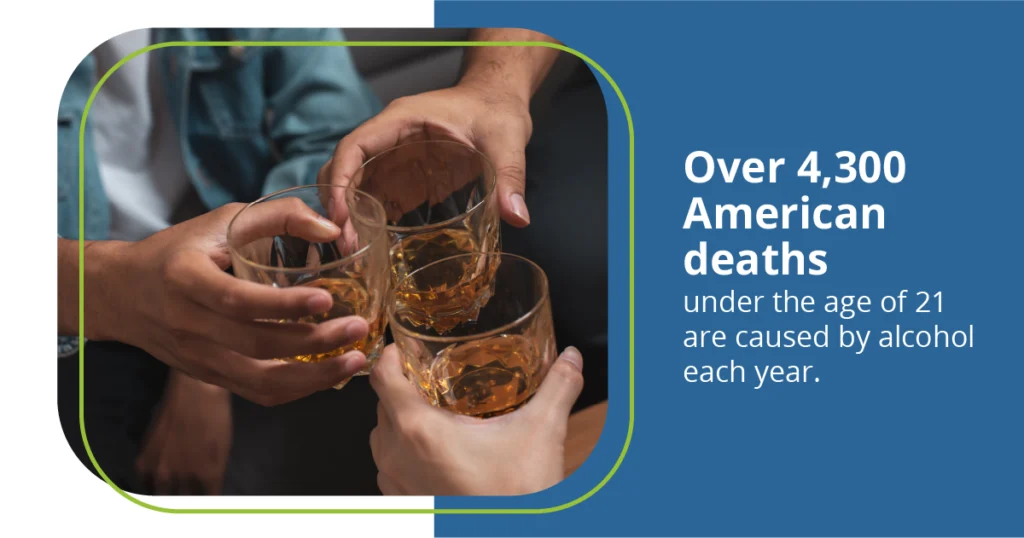Teen alcohol consumption and addiction are severe and ongoing issues in America. Up to 80% of high school students have tried alcohol at least once. Over 4,300 American deaths under the age of 21 are caused by alcohol each year.
Teens who frequently binge drink run the risk of developing alcohol poisoning and several health complications which require proper treatment.
Continue reading to learn more about how detox can help to prevent your child from alcohol dependency and negative consequences.
Key Takeaways
Teen culture in America is very much influenced by binge drinking. As a result, many teenagers develop alcohol use disorder. The Substance Misuse and Mental Health Services Administration (SAMHSA) reports that about 200,000 teenagers sought treatment for alcohol or other substance abuse problems in 2017. This article will discuss the following key points:
- The most frequently abused psychoactive substance in the US is alcohol.
- To ensure a secure recovery from alcohol, alcohol detox is an essential step taken for recovery
- Inpatient and outpatient rehab can help your child overcome addiction and achieve long-term sobriety.
Seek professional help from The Haven Detox -South Florida. Call us at (561) 328-8627 to learn more about our treatment programs and service charges.

Signs of Alcohol Abuse in Teens
Depending on the substance being abused, whether or not the person has combined alcohol and drugs, or when they last used the drugs or alcohol, there are different signs of alcohol and drug misuse. Teenage substance usage that affects behavior includes examples like:
- Creating new friendships with people who abuse drugs and alcohol
- Losing interest in academic and everyday activities
- Irritability
- Withdrawal (anxiety, depression, moodiness).
- Secrecy
- Insomnia
Parents may also detect the odor of alcohol on the teen’s breath or other blatant indications of drug addiction, such as:
- Weight loss
- Bad hygiene
- Dilated pupils
- Weight gain
- Dental decay
In cases of teen substance abuse, a medically-assisted detox is ideal. Reach out to a treatment provider to inquire about available treatment options for achieving long-term sobriety.
Why Do Young Adults Start Drinking?
Age-specific difficulties that young adults confront can result in substance addiction problems. Stress, loneliness, and low self-esteem can be brought on by things like learning to fit into social structures at school, hormone changes, teen pregnancies, bullying, and figuring out who they are.
Teenagers who have experienced trauma at an early age may also be scarred, which increases their chance of engaging in self-destructive activities.
If there is a history of mental illness or addiction in the family, teens are significantly more likely to use drugs. To attempt or abuse drugs and alcohol, people may be motivated by peer pressure, curiosity, or a desire to look cool.
The effects of teen alcohol abuse can be catastrophic, following them into adulthood due to continuous difficult circumstances, lack of support, and vulnerability in adolescence.
Understanding Detox Procedure
Alcohol is a hypnotic sedative. A physiological dependence develops with repeated intake. And when heavy drinking is abruptly reduced or halted, the individual experiences alcohol withdrawal.
Disturbances in the autonomic and central nervous systems are among the symptoms. Detox is quite effective. More than 70% of those who attend a detox facility complete it; more than half enroll in an alcohol rehabilitation program.
It is important to remember that detox alone is not a complete recovery. Detox will simply help alleviate symptoms of withdrawal or intense cravings throughout recovery. When there is less of a substance in the body, the less the person suffers from withdrawal.
A full addiction recovery requires therapy sessions where patients identify and address the patterns that have led them into addiction and learn healthier coping mechanisms in the future. This, combined with support from medical staff, family, and peers, is essential for a successful long-term recovery.
If your teen is still physiologically dependent on alcohol, no education, counseling, group therapy, or continuous support offered during alcohol rehabilitation will be effective.
Your teen won’t be in the right state of mind to understand the message of recovery until their body has completely rid itself of the alcohol and they are no longer suffering from severe withdrawal symptoms.
Alcohol withdrawal results in a hyper-excitable condition of the brain. This is the opposite of what happens when drinking, which is surprising.
Because of this, an alcohol detox must always be performed under a healthcare provider’s supervision.
Alcohol Withdrawal Symptoms
Alcohol Withdrawal Symptoms begin in as little as 6 hours following the last drink. Symptoms may include:
- Anxiety
- Headache
- Irritability or mood Swings
- Agitation or restlessness
- Irregular heart rhythm
- Increased body temperature
- Hypertension
- Mild hallucinations
- Profuse sweating
- Nausea or vomiting
- Severe insomnia
Medications Used During Alcohol Detox
Medication is an effective treatment for alcohol withdrawal and its negative consequences. It has two primary goals.
- It reduces acute withdrawal symptoms.
- It prevents dangerous complications.
The following are a few common medications used to treat alcohol withdrawal symptoms are including:
Benzodiazepines: Benzodiazepines are used for anxiety, confusion, and tremors and to lessen the risk of seizures or DTs.
Naltrexone: Naltrexone brand names include ReVia or Vivitrol. Naltrexone manages alcohol dependence by:
- Reducing how often heavy drinking occurs
- The number of weeks in which alcohol was consumed
- The amount of alcohol consumed when drinking occurs
Tegretol: A non-sedating, low abuse potential alternative to benzodiazepines.
Inpatient Teen Rehab
While receiving treatment in an inpatient facility, young people can access support groups, hands-on assistance regarding mental health issues, and medically assisted detox. Patients at a facility like ours will live in a drug- and alcohol-free environment with others who share their desire to abstain from hazardous substances.
Teens in inpatient rehab have the same access to mainstream treatments as adults do. Gender-specific teen inpatient facilities can aid in making all genders feel comfortable and understood.
Teenagers will also have easy access to individualized counseling, healthy diets and therapies, cutting-edge drugs, unusual activities and healing modalities, and the care of nurses and doctors.
The period of stay may be 30, 60, 90, or more days in a safe environment. There are alternatives for coed, men’s only, and women’s exclusively inpatient treatment. Get long-term recovery
Outpatient Teen Rehab
Teens in outpatient treatment facilities can balance their lives with their family members and their treatment. They can continue attending school while undergoing treatment, avoiding the difficulties of reintegrating into society after rehab.
Teens in outpatient rehab receive state-of-the-art medication, exceptional medical care, private counseling, and 12-Step groups, but they are free to leave after three hours.
Teens may find outpatient treatment program the best option because it is less expensive and allows them to maintain their current lifestyles.
For teenagers, intensive outpatient rehab provides advantages similar to outpatient therapy.
The patient’s progress is tracked, reducing the time they need to recover. Patients spend some time there, like outpatient rehab, and the rest of the time on campus.
If you are looking for support, you can get help from The Haven Detox- South Florida.
Frequently Asked Questions(FAQs)
How does alcohol affect adolescent development?
A teenager’s social growth may be hampered by alcohol if they begin drinking at a young age. Alcohol may harm your child’s physical, emotional, and mental health and negatively impact their educational performance and problem-solving abilities.
Alcohol has various adverse effects on the brain and how it functions, including the ability to make decisions, balance, and motor coordination issues, learning disabilities, linguistic skill impairments, alcoholism, and depression may be brought on by brain damage.
You should seek medical attention if your child is using drugs and starting to drink with friends.
Are there any rehab facilities for teens?
Teenage addiction is treated at several rehabilitation facilities. Treatment is provided by therapists and medical staff who have received special training in treating substance misuse effectively.
In addiction treatment centers, your child will be able to learn multiple effective and advanced techniques to handle stress and unfavorable situations that lead the child towards using drugs and start drinking.
Moreover, your child will also be able to listen to other fellow’s struggle stories and get motivated to refrain from drugs and drinking excessively.
How long does it take for the brain chemistry to return to normal after alcohol?
The brain is incredibly capable of healing itself, but it takes time. How severely excessive alcohol consumption damages your mind will decide how long it takes to recover. Your alcoholic blackouts’ severity or frequency will determine how long your brain’s neurotransmitters return to regular activity.
The brain’s chemistry may take up to two weeks to return to normal after extended durations of alcohol intoxication, though. In most cases, the brain does not recover from alcohol consumption for at least two weeks.
Help Your Child Toward an Addiction-Free Life with The Haven Detox-South Florida
We understand that teen substance abuse can be damaging as teens develop their personalities and identities.
We offer effective treatment programs, including medical detox, residential, and smart recovery treatment programs to help adolescents grow naturally, healthily, and poison freely.
Furthermore, we provide maximum effort to make the admission process quick and accessible for our clients. Our around-the-clock customer support is available to assist you in your quarries.
Call us at (561) 328-8627 to speak with our counselors to learn about the admission procedure.
Click here to learn more about our treatment programs and service charges.






